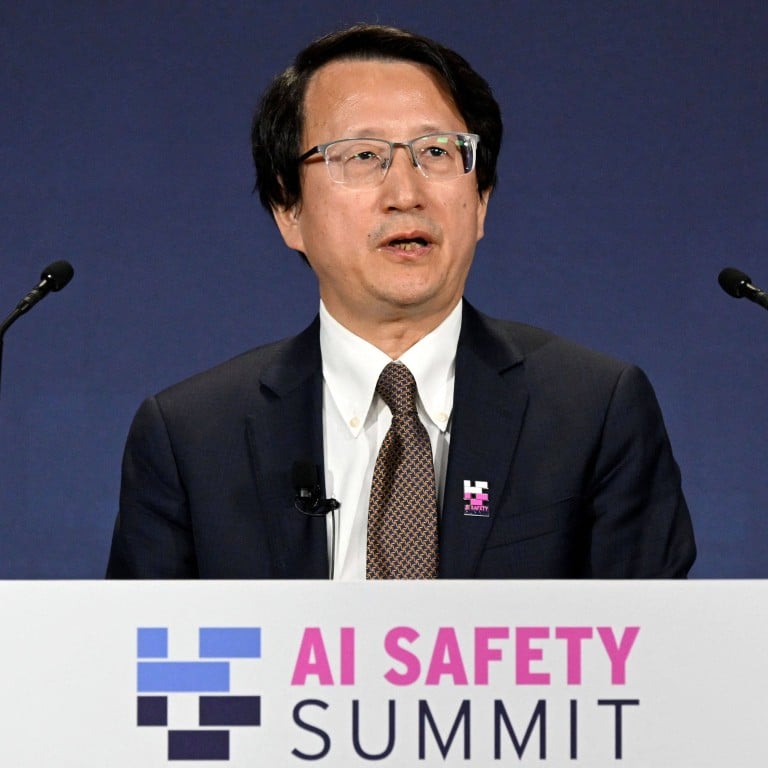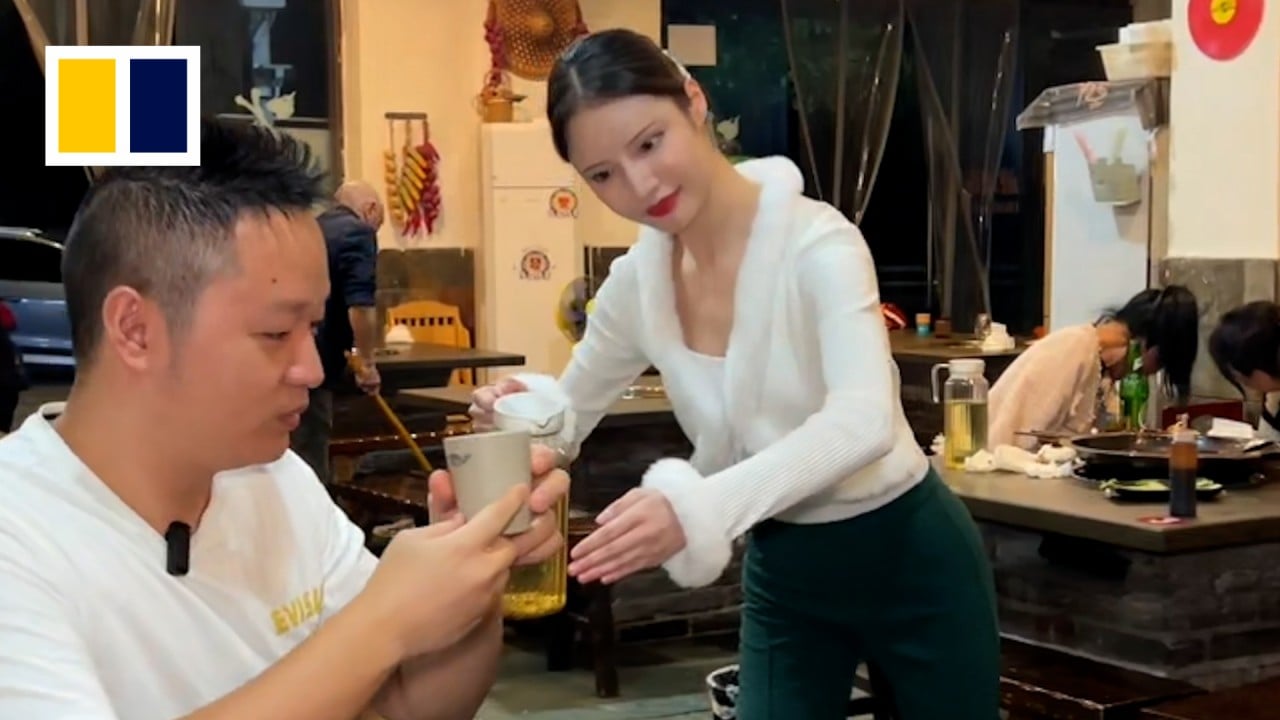
AI deal shows China and US can work together on tech regulation despite rivalry, analysts say
- The superpowers sign Bletchley Declaration, aimed at managing ‘catastrophic’ risks of the rapidly evolving technology
- Artificial intelligence and climate change could become ‘new ballast stones’ to anchor ties between Beijing and Washington, says foreign policy expert
The declaration – which focused on challenges posed by “frontier AI” systems – was reached at Bletchley Park, an English estate where Alan Turing and colleagues broke Germany’s Enigma code during World War II. In the 1950s, Turing developed the Turing Test, a deceptively simple method of determining whether a machine can demonstrate human intelligence.
US-China decoupling would harm AI governance: Henry Kissinger
Richard Ghiasy, senior fellow at Leiden University’s Leiden Asia Centre, said the development was “very significant” as it showed the two biggest tech powers had decided to put aside their differences in the global interest.
“AI is simultaneously a constructive and destructive force that does not respect borders so their coordination and cooperation to curb AI risks in critical,” he said.
It was the first international agreement signed by both China and the United States since 2018. Their last deal was an agreement on unregulated fishing in the central Arctic Ocean.
He added that AI cooperation was welcomed by Washington as it would facilitate greater dialogue, cooperation and hopefully more agreements with China.
“Bletchley was partial evidence of this and an important and positive first step,” he said.
Ghiasy said the agreement “signals to the rest of the world that the two giants, amidst all the punching, can take off their boxing gloves to coordinate and set rules if need be. This must soothe partial and impartial stakeholders, not to forget markets.”
Wu Zhaohui, China’s vice-minister of science and technology, led the Chinese delegation at the summit in Britain, saying Beijing would increase cooperation with the international community – including the US – to establish frameworks for the safe and responsible development of AI.
“China is willing to enhance our dialogue and communication in AI safety will all sides, contributing to an international mechanism with global participation in governance framework,” he said.
Wu also used his address to stress the rights of countries to develop and use AI technologies.
“We uphold the principles of mutual respect, equality and mutual benefits. Countries, regardless of their size and scale, have equal rights to develop and use AI,” he said.
Britain invited China to the global summit despite opposition, including from former leader Liz Truss, with Prime Minister Rishi Sunak defending the move as the “right decision”.
He told Politico there “can’t really be a substantive conversation about AI without involving the world’s leading AI nations. And China is indisputably one of those”.
Wu’s speech echoed sentiments highlighted in China’s own global framework for AI, unveiled at the Belt and Road Forum for International Cooperation last month, which called for “equal rights” in development, regardless of a country’s political system.
Called the Global AI Governance Initiative, the Chinese framework calls for mutual respect and opposes “drawing ideological lines or forming exclusive groups” to obstruct AI development by other countries.
At the belt and road forum, Chinese President Xi Jinping said the country stood ready to boost exchanges with countries to promote the “healthy, orderly and safe” development of AI.
China launches AI framework, urges equal AI rights for all nations
China, the US and other countries have rushed to set rules and standards governing the emerging technology amid growing concerns about the challenges and risks involved.
US President Joe Biden last month signed an executive order that sought to advance responsible AI innovation and reduce the technology’s risks to consumers and national security.
Chong Ja Ian, professor of political science at the National University of Singapore, said AI was an area where countries had a shared interest in adopting regulations.
Similar to climate issues and transnational crime, China-US AI cooperation served the interests of both powers to help prevent abuse and the loss of control over the quickly evolving field, he said.
“Paraphrasing the Biden administration’s language, AI may be an area where the US and China must find areas where they can cooperate – especially since both are important actors where it comes to AI,” he said.
Wang Yiwei, an international relations professor at Renmin University in Beijing, said that while China and the US continued to engage in strategic competition, they were faced with “common challenges and threats to mankind” – including AI.
He noted that former US secretary of state Henry Kissinger in September warned that a decoupling of the Chinese and American economies would hurt their ability to manage AI-related challenges.
He urged China and the US to cooperate on regulating AI use, without “an attempt for one side to achieve domination”.
Wang, stressing that AI would pose a “huge challenge to the human race”, suggested that Beijing and Washington could exchange ideas and come up with global rules and standards together.
He said there was growing urgency to find “new ballast stones” to anchor the relationship between the two world powers, noting that “economics and trade were not enough”.
“Artificial intelligence and climate change may become new ones,” he said.
Despite a heated rivalry on a range of issues, the two countries have in recent months sought to revive efforts to tackle climate change.
As China makes new rules, AI developers will ‘dance with shackles on’
In July, Washington’s climate envoy John Kerry visited Beijing, where he held talks with his climate counterpart Xie Zhenhua. The American is set to meet Xie again later this week in California for further talks, according to China’s Ministry of Ecology and Environment.
“We are all human beings, and on issues such as climate change and artificial intelligence, a community with a shared future for mankind should indeed be established,” Wang said.
Ghiasy said AI regulation was one “critical domain” where the two rival countries could portray themselves as responsible major powers, alongside other global issues such as climate change, nuclear non-proliferation and counter terrorism.
But he added that he did not expect the two countries to see eye-to-eye entirely in any of these areas.
“The two giants will continue to assess and cooperate on a case-to-case basis, driven only by the necessary degree of urgency,” he said.
“If there is space for manoeuvring in a favourable strategic position or pushing the other into an unfavourable position, they will surely continue to seize that.”


